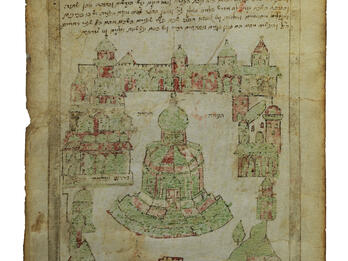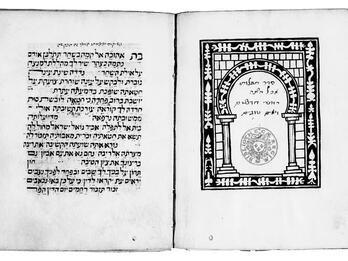Sefer yuḥasin (Book of Genealogies)
Introduction
Thus said Abraham the son of Samuel the son of Abraham Zacuto, may his memory be for the world to come. [ . . . ] [T]o bring merit upon myself and others, I was motivated to write this small book, in which I will present by name and number the genealogy of the sages of the Mishnah and the Babylonian Talmud, as they appear before us, aside from most of the sages of the Baraita, because neither they nor their time are known to me. [ . . . ] [S]o that I might have the merit of recalling the laws and the important personal virtues of which they spoke and according to which they would conduct themselves, I composed this book. It is a worthy task for me, for it lists the generations from the start of creation, which is the origin of the world. [ . . . ] This book is similar in this regard to the science of numbers and astronomy, and thus the performance of one commandment leads to another.
At first I thought: what should be the name of the book? If I were to call it “The Book of Righteous,” I would detract from the honor of the pious, as some of the sages were certainly pious individuals, for it is taught that “an ignorant person cannot be pious” [m. Avot 5:2], and Rashi adds that an ignorant man could be a God-fearing individual. [ . . . ] Therefore I called it Sefer yuḥasin [Book of Genealogy], as the sages, may they rest in peace, called [a similar book] thus in Tractate Pesaḥim, Chapter 5: R. Simlai came before R. Yoḥanan; he said, “Let my master teach me the Book of Genealogy,” and Rashi explains that this means a teaching on Chronicles [b. Pesaḥim 62b]. [ . . . ]
Chapter Five
And in the year 5252 [1492] on the first day of the year of the Christians, which is the first day of January, he [Ferdinand] conquered Granada, at which point they decreed expulsion upon the Jews. After four months, they sent the herald at the end of April throughout every single state, with trumpets, saying that all the Jews should leave his kingdom within three months, which came to the seventh day in the month of Av. The decree included Castile, Aragon, Granada, Sardinia, Sicily, Majorca, and Menorca—all the states of his kingdom. Some of them then went to Turkey, others to Africa, especially the cities of Fez and Oran, but hunger and plague followed them there, and almost did away with them all. However, most of those from Castile went to Portugal, because they were unable to leave quickly enough to go by sea, and they gave a tithe from all their property. They had to pay one ducat for each person, in addition to the third of a ducat for permission to pass through the provinces. They also had to give a quarter of all the wealth they brought in; some of them close to a third. Even someone who had no savings at all had to pay a ransom of eight ducats, otherwise they would be imprisoned.
Time itself would expire before we would exhaust all the things that could be related about Portugal, as more than a hundred and twenty thousand souls entered, and yet only a few of them survived the plague. Some were captured, with their sons they were taken and sent off to the islands of the sea, and others apostatized due to the many tribulations. Eventually, in the year 257 [1497], the second king who reigned—a persecutor of the Jews—on Sunday 24 of December, 29 Kislev, during Hanukkah, in Porto de Muge, near Santarém, decreed the expulsion from Portugal, within eleven months, so they would have to contemplate their departure every day.
There was a greater forced conversion in that year than had ever been before. On the eve of Shabbat Hagadol [the Sabbath before Passover], it was decreed that they should remove young boys and girls from the community in Iberia and from all of the kingdom of Portugal. And there was a great outcry in Iberia to the king, like none that had ever been before, but on Passover they came and took all the boys and girls and the decree was circulated that even old people would be removed from the group against their will, and many of them died in sanctification of the name of God, as they killed themselves.
In that same year there was also an expulsion from all the kingdom of Navarre, to the effect that not a single Jew remained in all of Spain except for fifty Jews who fled to Seville. They were imprisoned there for two years until the year 249 [1499], in the month of Av, when they were removed to be sold, and they were taken to Algeria which is in the land of Africa, between Oran and Bougie [Béjaïa]; it belongs to the king of Bougie, and it is located on the coast.
R. Simeon Duran and all his family remained there until this day, and they ransomed them there for seven hundred ducats, for although it is a small community in quantity, it is great in quality. May the blessed and exalted God give them a good reward in this world and the next. Thus the holy community of Bougie, may the Rock preserve it, provided assistance. At that point, no Jew remained in all of Spain; may God gather in all the exiles and build the Temple soon in our day. Amen, may it be His will.
Translated by
.
Credits
Abraham Zacuto, Sefer yuḥasin (Book of Genealogies) (Constantinople, 1566). Republished as: Abraham Samuel Zacuto, Sefer yuḥasin ha-shalem (Warsaw, 1876).
Published in: The Posen Library of Jewish Culture and Civilization, vol. 5.




